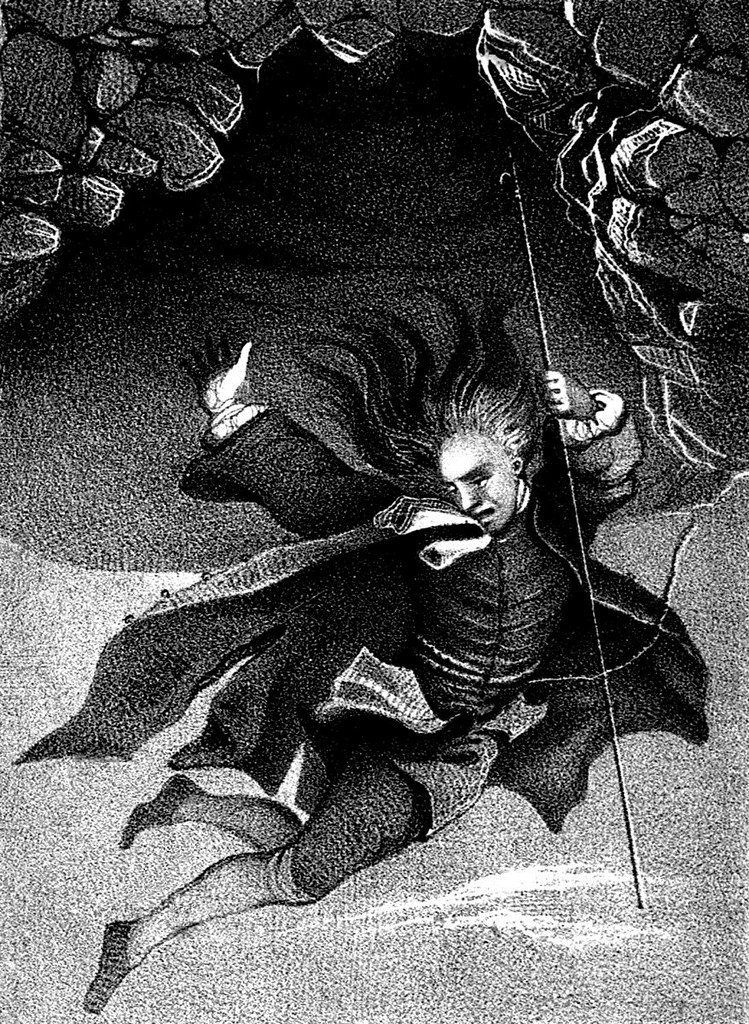"In accordance with your royal order, we hereby send the animal, which sometime since came down to us from the firmament; which animal calls itself man.
We have, with sedulous care and patient industry, taught this singular creature in our school, and after a very severe examination, pronounce it to be very quick in its perceptions and very docile in its manners.
Nevertheless, from its obtuse and miserable judgement — which we believe arises from its too hasty inferences — its ridiculous scepticism on unquestionable points, and its no less ridiculous credulity on doubtful ones, we may scarcely number it among sensible beings."
'Nicolai Klimii Iter Subterraneum' (original 1741 title)
or 'Niels Klims Forundelige Reise'
or 'Niels Klim's journey under the ground being a narrative of his wonderful descent to the subterranean lands; together with an account of the sensible animals and trees inhabiting the planet Nazar and the Firmament'.
[by Norwegian-Danish author, Ludvig Holberg]

Niels Klim's descent to the planet Nazar [1845 edition]
[alternative version 1789]

[1834 edition]







[1834 edition]

En Inbyggare i Potu [1767 edition]

En inbyggare i Musikanterland [1767 edition]

Et måltid i Mezendora [1767 edition]
Louis Holberg's 1741 science fiction / fantasy / utopian / satirical novel derides his contemporary 18th century society while drawing inspiration from Thomas More's Utopia and Jonathan Swift's Gulliver's Travels.
"His only novel, it describes a utopian society from an outsider's point of view, and often pokes fun at diverse cultural and social topics such as morality, science, sexual equality, religion, governments, and philosophy."It was considered too radical for Nordic culture, so the first edition was published in Latin in Germany where it circulated to a much wider audience and its popularity ensured it was quickly translated into a number of languages.
"One of the most influential 18th century works of proto-SF satire, it describes the fantastic voyage of Niels Klim through a hole in a mountain (the name Holberg can be translated as "hollow mountain") into a hollow earth on the model suggested by Edmond Halley, in which a minute internal sun is circled by the planet Nazar.From the 1845 introduction (in English):
Here Klim finds himself in the land of Potu [ie 'Utop'], whose inhabitants show a societal pattern diametrically opposed to that of the contemporary stereotype: women are the dominant sex and males perform only menial tasks."
"There are many persons of both sexes in my country, who believe in fairies and supernatural beings, and who are ready to swear, that they have been conveyed by spirits to hills and mountain caves.
This superstition is ridiculed in Klim, the hero of the tale. He is supposed to be transported to the world under ground, where he meets with some surprising adventures. Many strange creatures inhabit this new world; trees, for instance, are introduced, endowed with speech, and musical instruments discuss questions of philosophy and finance.
Amongst the characters, those geniuses, who perceive everything at a glance, but penetrate nothing, are conspicuous. People of quick perception, whom we use to admire, are despised by the Potuans, who look upon them as idle loungers, that, though always moving, make no progress. Prudent men, on the contrary, who measure their own strength, and advance cautiously, are greatly esteemed by that nation, though with us they pass for fools or cowards.
The Potuans and Martinians are examples of both these extremes. By the former Klim was considered a blockhead, on account of the quickness of his perceptions; by the latter he was equally despised for the slowness of his apprehension. To Klim, who measures virtues and vices by the ordinary standard, everything is a paradox; but what he at first condemns, he admires and extols after deliberation; so that the object of the whole work is to correct popular errors, and to distinguish the semblance of virtue and vice from the reality. Its subordinate design is to expose the monstrous fictions, which some authors obtrude upon us in their descriptions of remote countries."
- The majority of images above are kindly made available through Norway's Bergen Public Library Flickr set {thanks Håvard!} [Homepage of Bergen Offentlige Bibliotek].
- 'Niels Klim's journey under the ground by baron Ludvig Holberg' [1845 edition] is available in full in English at Project Gutenberg.
- HOLBERG, LUDVIG from the (new) beta version of the Encylopedia of Science Fiction [via Metafilter]
- Wikipedia: Niels Klim's Underground Travels and Ludvig Holberg (bio).
- The (contentious) History of Science Fiction / Early History of Science Fiction.
- Via the always excellent Princeton Graphic Arts blog.
- Previously (highly recommended): Flight to Antipodes, featuring the marvellously eccentric proto-SF work by Nicolas-Edmé Restif de la Bretonne (1781).
- 'The Journey of Niels Klim to the World Underground' by Ludvig Holberg on Amazon.
- UPDATE: Go see: Stories of a Hollow Earth at the Public Domain Review : "Peter Fitting, author of Subterranean Worlds: A Critical Anthology, explores Holberg’s book in the wider context of the hollow earth theory."
Tidak ada komentar:
Posting Komentar